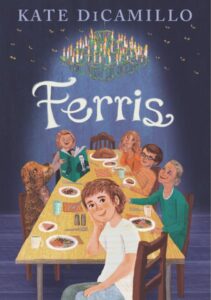Review of the Day: Ferris by Kate DiCamillo

Ferris
By Kate DiCamillo
Candlewick Press
$18.99
ISBN: 9781536231052
Ages 7-10
On shelves now
I think I have issues with the way other people talk about Kate DiCamillo. You know when you’re into a band, and you feel like you know it particularly well, but then one day you read a review of it on some website and the interpretation someone else has of that band strikes you as so very very wrong? That’s pretty much my situation here. The fawning praises DiCamillo receives are nice, but they make her work sound oddly sentimental. Sentimental. A word which, in and of itself, should not be a bad thing, but all I can think of when I say it is Precious Moments figurines. And DiCamillo is no figurine. She’s not a stereotypically sweet little author writing variations on Love You Forever. There’s a thread of darkness that runs like a vein throughout her work and has the effect of making most of her middle grade novels particularly interesting. It’s the kind of darkness she’s taken years to hone and perfect. Certainly it skewed a bit too far afield in some of her earliest books (unpopular opinion: I believe that DiCamillo had to work Despereaux and Tulane out of her system before she could get to where she is today). Now there’s a level of confidence to her writing and Ferris, her latest title, takes that experience and knowledge and weaves it into what has to be her most personal book to date. I have issues with the way other people talk about DiCamillo. I do not have issues with this book.
Things have gotten complicated in Ferris’s home. Her six-year-old sister Pinky has vowed to become an outlaw. Her beloved grandmother Charisse is feeling poorly and, if that were not enough, is also seeing ghosts. Her uncle has left his wife and is in Ferris’s basement, hoping to create a painted masterpiece. And is that a raccoon in the attic? Is it even there? Charisse says, “Every good story is a love story.” This may be true, but for Ferris it’s also a story about perms, roofs that smell like hot tar, chandeliers lit with discombobulated candles, a wide variety of women and how they see the world, and more.
ADVERTISEMENT
ADVERTISEMENT
I am already doing everything wrong with this review. Under normal circumstances, when I determine that I want to review a book, I eschew any and all reviews of it. I read it cold, only knowing about it in the vaguest of terms. Then I sit down, write my review while everything’s nice and fresh in my cranium, and that’s that. But that didn’t happen this time. This time, I was 50% through the book when I saw Kate DiCamillo speak about this book at the annual Anderson’s Breakfast celebration in Woodridge, Illinois. She gave the big closing speech and the topic was, unsurprisingly, this book (which, to be fair, I should have seen coming) along with some very personal information about her father. If you read the New Yorker profile of DiCamillo back in September of 2023, then you know that her relationship with the man was fraught throughout most of her life. The article touched on that fact here and there. In contrast, in her speech, DiCamillo was hardly so dainty, and dove right in, telling a large room full of hundreds of people large swaths of her life. The speech itself was dotted with references to Ferris too. Or maybe it’s just that Ferris is loaded down with significant objects, moments, music, and people from DiCamillo’s own life. Much of great literature happens because of real world antecedents. The question is, where does the author draw the line?
Which brings us to the darkness. That thread of darkness I mentioned earlier? It manifests itself in some ways in this book in the form of Pinky. Pinky would be Ferris’s six-year-old little sister. Relatively recently, the girl has developed a lifelong ambition to become a notorious criminal, and is prone to using terms like, “Stand aside, fools”. She’s the kind of kid willing to not only steal a pair of pliers but to then use them to pull out her own two front teeth. We’ve all met a Pinky somewhere in our lives. Many of us are related to one. After a failed bank robbery, Pinky switches focus and becomes obsessed with Houdini and escape rather than getting her face on a wanted poster. What’s so interesting about the book is that DiCamillo hints that there’s something going on with Pinky, but Ferris, wrapped up in her own problems, never really takes the time (or wants to take the time) to dissect what makes Pinky tick. By the end the girls have established a new closeness, but I still sense a bit of a distance there. Pinky is also, I would add, a saving grace of the book. Pinkys are, by necessity, necessary to good literature. They cut through the treacle.
It’s always interesting to watch how much humor DiCamillo chooses to add to one book or another. On the high end you get something like Bink and Gollie and on the low end there are books like Tiger Rising. Ferris tilts more in a Bink and Gollie-like direction without falling into out-and-out hilarity. The jokes here come in a steady stream, just above a drip, nowhere near a torrent. Some of these are aimed squarely at adults and wise-beyond-their-years-children. One example might be when Ferris asks her grandmother what she’s afraid of and the woman replies, “Indignities.” When Ferris says she doesn’t understand, she’s met with, “Isn’t that wonderful?… I’m so pleased that you don’t understand.” Some of the humor comes in the description of things. Lines like the one involving a doctor with a stethoscope to her grandmother’s chest. “He looked like someone trying to crack a safe, working to get the combination to Charisse.” But for me, some of the best funny moments in this book involve six-year-old Pinky. Ferris is trying to have a moment with her sister near the end of her book, and Pinky is having none of it. When she repeats to her that she loves her, Pinky (who is lisping a bit from those two missing front teeth) replies, “I heard you the firth time.”
I started writing this book review on a Monday, but hadn’t finished it by Thursday. It took me an entire second week get it done. In the interim, a review of this book was posted online in the New York Times. Reading the headline I see that it says that this book is “a balm to the soul”. Do you begin to understand why I twitch a little when people talk about Kate like this? I’m not saying that there’s anything wrong with a “balm to the soul” in theory, but when every review of her sounds like this, it squelches what makes her so doggone interesting. And she IS interesting. Her books are interesting. They’re full of blood-covered girls sleeping alongside goats and self-tooth extraction and paintings of angels with deep blue wings. They have music, like the song “Mysterious Barricades” (which you really should look up and listen to if you get a chance). Because this book is so very personal to DiCamillo I do not think it will be remembered as one of her greatest books. Just a merely great one. And remember, if this were written by anyone else, we’d hardly write it off as merely great. An addition to a child’s bookshelf that may say more about the child as reader, and DiCamillo as a person, than anything else.
On shelves now.
Source: Final copy sent from publisher for review.
Filed under: Best Books, Best Books of 2024, Review 2024, Reviews
About Betsy Bird
Betsy Bird is currently the Collection Development Manager of the Evanston Public Library system and a former Materials Specialist for New York Public Library. She has served on Newbery, written for Horn Book, and has done other lovely little things that she'd love to tell you about but that she's sure you'd find more interesting to hear of in person. Her opinions are her own and do not reflect those of EPL, SLJ, or any of the other acronyms you might be able to name. Follow her on Twitter: @fuseeight.
ADVERTISEMENT
ADVERTISEMENT
SLJ Blog Network
Name That LEGO Book Cover! (#53)
Exclusive: Vol. 2 of The Weirn Books Is Coming in October | News
Fighting Public School Book Bans with the Civil Rights Act
Take Five: Middle Grade Anthologies and Short Story Collections
ADVERTISEMENT







